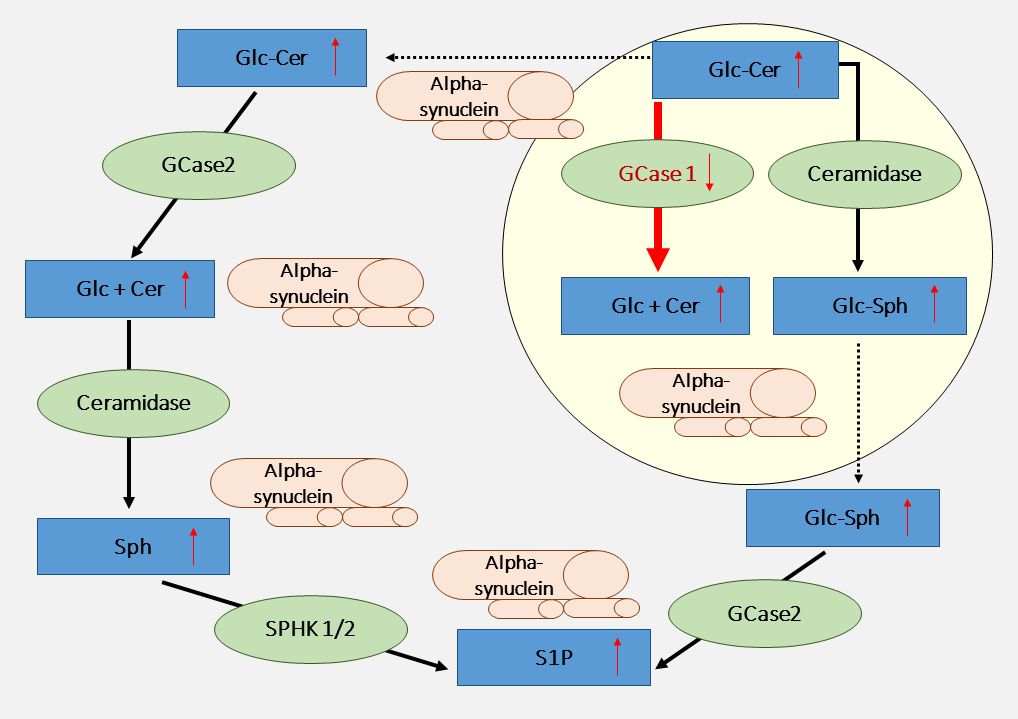Session Information
Date: Monday, September 23, 2019
Session Title: Genetics
Session Time: 1:45pm-3:15pm
Location: Les Muses Terrace, Level 3
Objective: To assess the GBA1-pathway-specific biomarker profile in patient-derived CSF.
Background: Heterozygous mutations in the GBA1 gene represent the most common genetic risk factor for synucleinopathies such as PD and DLB. Experimental evidence suggests that GBA1 mutations result in lower GCase1 activity and cause a build-up of lysosomal glucosylceramides which also impairs the lysosomal degradation of alpha-synuclein and promote its aggregation.
Method: We measured GCase1 activity, CSF levels of glucosylceramides (upstream substrate of GCase1), CSF levels of ceramides and sphingosines (downstream product of GCase1) and CSF levels of total alpha-synuclein in PDGBA patients compared to PDidiopathic patients and healthy control participants (HC).
Results: (1) GCase1 activity was significantly lower in PDGBA compared to PDidiopathic and HC with lowest levels in PDGBA_severe. (2) CSF levels of glucosylceramides did not differ significantly between PDGBA, PDidiopathic and HC whereas CSF levels of ceramides and sphingosine-1-phosphate which represent products downstream of GCase1 were higher in PDGBA with highest levels in PDGBA_severe. (3) CSF levels of total alpha-synuclein were lower in PDGBA compared to PDidiopathic and to HC and lowest in PDGBA_severe.
Conclusion: These findings are of special interest since in case of lysosomal GCase1 deficiency, glycosylceramides are alternatively processed to ceramides and sphingosines in the cytosol. Cell culture models show that not only glycosylceramides but also downstream products such as glucosylsphingosines, sphingosine, and sphingosine-1-phosphate promote the formation of oligomeric alpha-synuclein. Bridging experimental data and present findings in patients, a congruent picture of molecular mechanisms in GBA1-associated Parkinsonism arises. With interventional trials in this genetically stratified patient cohort under way, these findings offer entry points for patient stratification, biochemical readouts and possibly new treatment targets.
To cite this abstract in AMA style:
S. Lerche, C. Schulte, G. Machetanz, I. Wurster, B. Röben, M. Zimmermann, C. Deuschle, A. Hauser, I. Liepelt-Scarfone, J. Böhringer, I. Krägeloh-Mann, I. Lachmann, W. Maetzler, T. Gasser, M. Mielke, D. Berg, K. Brockmann. GBA1 biomarkers in longitudinal CSF: GCase, Sphingolipids and alpha-synuclein [abstract]. Mov Disord. 2019; 34 (suppl 2). https://www.mdsabstracts.org/abstract/gba1-biomarkers-in-longitudinal-csf-gcase-sphingolipids-and-alpha-synuclein/. Accessed December 23, 2025.« Back to 2019 International Congress
MDS Abstracts - https://www.mdsabstracts.org/abstract/gba1-biomarkers-in-longitudinal-csf-gcase-sphingolipids-and-alpha-synuclein/

